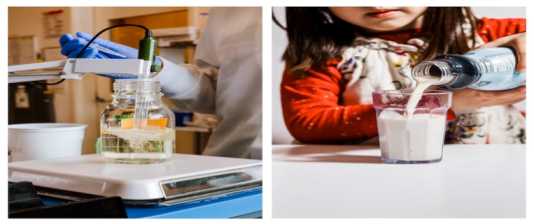The first course was a celery root soup lush with whole milk. The last was a spice cake topped with maple cream cheese frosting, served with a side of ice cream. And then a latte with its fat cap of glossy foam. In all, a delicious lunch. Maybe a little heavy on the dairy.
Only this dairy was different. It was not the product of a cow or soybean or nut. The main ingredient of this milk was made by microbes in a lab, turned into tasty and recognizable food, and then served to a hungry reporter.
Lab-grown meat is coming. But lab-grown dairy has already arrived.
Dozens of companies have sprouted up in recent months to develop milk proteins made by yeasts or fungi, including Perfect Day, the California-based dairy company that laid out this unusual spread. The companies’ products are already on store shelves in the form of yogurt, cheese and ice cream, often labeled “animal-free.” The burgeoning industry, which calls itself “precision fermentation,” has its own trade organization, and big-name food manufacturers such as Nestlé, Starbucks and General Mills have already signed on as customers.
The rapid advancement in this area has sparked hope for a revolution in the dairy industry, and not just because it’s kinder to the cows. Precision dairy doesn’t have cholesterol, lactose, growth hormones or antibiotics (though those with dairy allergies should beware). And cattle, for beef or dairy, is said to be the No. 1 agricultural source of greenhouse gases worldwide. Consumers concerned about climate change or animal welfare have been anticipating the U.S. launch of cultivated meat, which is grown in labs from animal cells, but cultivated dairy could have just as much of an impact on the environment — with fewer regulatory hurdles to clear.
Despite widespread acceptance of soy, oat and almond milk, U.S. consumers, even vegan ones, continue to be underwhelmed by plant-based cheese options: Mostly made of starch and oil, they often lack the flavor or texture (no gooey strings, not enough bounce) of real cheese. And cheese is especially bothersome for the environment, more so than its liquid counterpart: Making one pound of cheese requires 10 pounds (or about five quarts) of cow’s milk. The World Economic Forum and many scientific reports suggest cheese generates the third-highest emissions in agriculture after beef and lamb.
For Ryan Pandya, chief executive of Perfect Day, those are the problems he’s solving. But it really started as a bagel problem.
Studying chemistry and bioengineering at Tufts, he’d gone vegetarian but still had a craving and taste for animal products.
“I had a bagel with vegan cream cheese that was so bad that it led me to investigate. What’s so hard about this? A lot of dairy alternatives are not made of food,” he said with a wince.
He hit upon a process called precision fermentation, similar to what has been used for decades to brew beer, make insulin for diabetic patients or produce rennet for cheese.
“Rather than using 22nd-century technology to produce meat, we’re using 20th-century technology to produce milk protein,” he said.
There are bubbling stainless steel fermentation tanks, software that maintains temperatures, agitator motors and oxygenators. And after the microbes eat their sugar solution and are programmed to make the desired proteins, there’s a lengthy process to separate the milk protein from the medium, then to wash it and dry it in a spray dryer so the powder can be used to make food.
Beyond the fermentation process, making usable milk proteins is similar to that at regular cow dairies, which have stainless steel tanks, spray dryers and freeze dryers, pasteurizers and vacuum pumps, chillers and steamers. “We get to the same powder, but these are the cows,” said Irina Gerry, chief marketing officer at Change Foods in Palo Alto, Calif., pointing to the fermenters in their San Jose lab.
The world’s demand for dairy keeps going up. But it’s not necessarily liquid milk. As countries develop and have burgeoning middle classes, the demand for liquid milk drops and enthusiasm for cheese and other products skyrockets. The cheese category has grown 19 percent since 2017, according to Mintel’s Future of Cheese 2022 report, with plant-based versions making up a minuscule part of that market.
General Mills, which produces household brands like Betty Crocker, Pillsbury, Annie’s, Nature Valley and Häagen-Dazs, launched a series of Bold Cultr cream cheeses, first using precision-dairy milk proteins from Perfect Day, then from Israeli foodtech start-up Remilk. (Last month, General Mills said it was “deprioritizing funding” for these cream cheeses, so its future is uncertain.) Perfect Day’s ingredients are being used in Brave Robot ice cream in the United States, Modern Kitchen cream cheese in the United States, California Performance Co. protein powder in the United States, Singapore and Hong Kong; and Coolhaus ice cream products in the United States and Singapore.
Perfect Day, the first to market in the United States, is also partnering with Mars, Nestlé, Starbucks, Graeter’s and other companies to provide milk protein for products. Its office is a gleaming, multistory facility in an industrial part of Berkeley, Calif. that has become a locus for food and biotech start-ups. It has fermentation and separations teams, analytics and regulatory experts, legal and logistics teams, as well as two full-time chefs to prototype products and dishes in a sleek exhibition kitchen. In addition to its Berkeley facility, the company operates a 90,000-square-foot production facility in Bangalore, India and a 58,000-square-foot factory in Salt Lake City.
Change Foods, founded in 2020, is headquartered in both Australia and the United States, and is in the process of building a commercial manufacturing plant in Abu Dhabi that will produce the volume of animal-free milk protein casein equivalent to the output of 10,000 dairy cows. Like Perfect Day, it aims to be an ingredient company that supplies its milk protein to other established food companies, but it will launch its own branded cheese products in 2025.
SOURCE : Washington Post March 12th 2023

